

Library Search: Testing, Testing. Noindex/2013_PDKGallup.pdf. A Nation Divided: Americans' Views of Public Education in the United States. On August 22, 2012, Gallup and Phi Delta Kappa International (PDK) -- the world's premier professional association for educators -- will release findings from the 44th annual PDK/Gallup Poll of the Public's Attitudes Toward the Public Schools at a summit in Washington, D.C.

Americans agree on many important educational topics, such as supporting urban schools, better preparing high school students for work and college, closing the achievement gap, and the need for high-quality teachers. However, this year's study finds them sharply divided on topics such as the role of standardized test scores, vouchers, access to public education for children of illegal immigrants, and which political party and which presidential candidate would have a more positive influence on U.S. education. Prominent speakers and panelists will present this new research and discuss what common ground exists for building solutions that bring positive change to the American public education experience. Accountability without Angst?: Public Opinion and No Child Left Behind. With January 2002 now a distant memory, it is easy to forget that the passage of the No Child Left Behind Act (NCLB) was initially embraced as a bipartisan triumph.
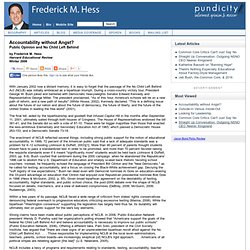
During a cross-country victory tour, President George W. Bush joked and bantered with Democratic heavyweights Senator Edward Kennedy and Representative George Miller. Www.ets.org/Media/Research/pdf/PICTOOMUCH.pdf. AB 484 Assembly Bill – AMENDED. More Parents Opting Kids Out Of Standardized Tests. DELAWARE TOWNSHIP, N.J. -- While his eighth-grade classmates took state standardized tests this spring, Tucker Richardson woke up late and played basketball in his Delaware Township driveway.
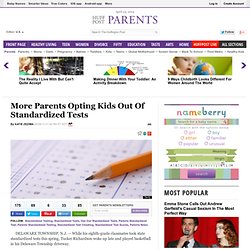
EBL Reader - The Myths of Standardized Tests : Why They Don't Tell You What You Think They Do. Get Involved - K-12/ARN. Welcome to FairTest's Assessment Reform Network — a national project created to support parents, teachers, students and others who are working to end the overuse and misuse of standardized testing in public education and to promote authentic forms of assessment.
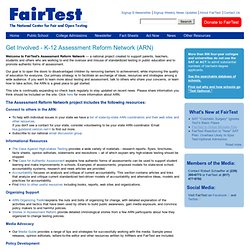
Our goal is to open the doors to disadvantaged children by removing barriers to achievement, while improving the quality of education for everyone. Our primary strategy is to facilitate an exchange of ideas, resources and strategies among a wide audience. If you want to learn more about testing and assessment, talk to others who share your concerns, or learn how to take action, the ARN is a great place to get started. This site is continually expanding so check back regularly to stay updated on recent news. Please share information you think should be included on the site. Connect to others in the ARN: Informational Resources Organizing Support. EBL Reader - The Myths of Standardized Tests : Why They Don't Tell You What You Think They Do.
EBL Reader - The Myths of Standardized Tests : Why They Don't Tell You What You Think They Do. Standardized Tests - ProCon.org. What is Performance-Based Learning and Assessment, and Why is it Important? An alternative to standardized testing for student assessment. (Scholastic.com) Standardized tests have dominated the school reform discussion for years, with students scores used – often unfairly – to judge the kids as well as their schools, teachers, principals, districts and even states.
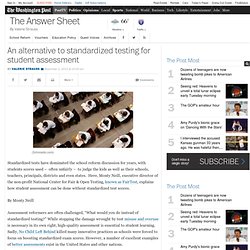
Here, Monty Neill, executive director of the non-profit National Center for Fair & Open Testing, known as FairTest, explains how student assessment can be done without standardized test scores. By Monty Neill Assessment reformers are often challenged, “What would you do instead of standardized testing?” While stopping the damage wrought by test misuse and overuse is necessary in its own right, high-quality assessment is essential to student learning. One top-notch alternative is conducted by the New York Performance Standards Consortium, an alliance of 28 public high schools. In 2011, 86% of African American and 90% of Latino male graduates of Consortium schools were accepted to college. The Policy Element - Controversial Issues (Capstone and American Dilemmas) - Research Guides at St. Edward's University. In order to write a CAPS or AD paper, you will need to find an associated policy that directly attempts to solve your social problem.
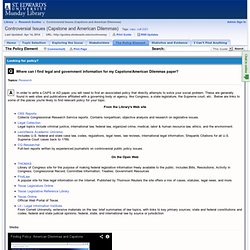
These are generally found in web sites and publications affiliated with a governing body or agency, like Congress, a state legislature, the Supreme court, etc. Below are links to some of the places you're likely to find relevant policy for your topic. From the Library's Web site CRS Reports Collects Congressional Research Service reports. Standardized Tests - ProCon.org. No Child Left Behind Act. The No Child Left Behind Act of 2001 (NCLB)[1][2] is a United States Act of Congress that is a reauthorization of the Elementary and Secondary Education Act, which included Title I, the government's flagship aid program for disadvantaged students.[3] NCLB supports standards-based education reform based on the premise that setting high standards and establishing measurable goals can improve individual outcomes in education.
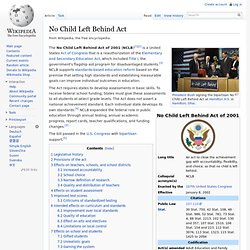
The Act requires states to develop assessments in basic skills. To receive federal school funding, States must give these assessments to all students at select grade levels. The Act does not assert a national achievement standard. Each individual state develops its own standards.[4] NCLB expanded the federal role in public education through annual testing, annual academic progress, report cards, teacher qualifications, and funding changes.[3] The bill passed in the U.S.
Legislative history[edit] Provisions of the act[edit] Increased accountability[edit]